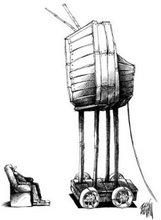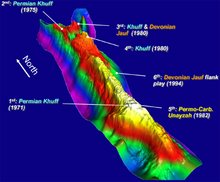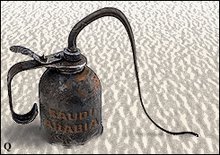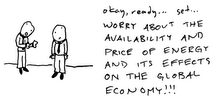RAISE YOUR AWARENESS
Focus____________Hard

We can't avoid going where the laws of physics are taking us.
What is Peak Oil?
"Peak Oil is the simplest label for the problem of energy resource depletion, or more specifically, the peak in global oil production. Oil is a finite, non-renewable resource, one that has powered phenomenal economic and population growth over the last century and a half. The rate of oil 'production,' meaning extraction and refining (currently about 84 million barrels/day), has grown in most years over the last century, but once we go through the halfway point of all reserves, production becomes ever more likely to decline, hence 'peak'. Peak Oil means not 'running out of oil', but 'running out of cheap oil'. For societies leveraged on ever increasing amounts of cheap oil, the consequences may be dire. Without significant successful cultural reform, economic and social decline seems inevitable." http://www.energybulletin.net
supply and demand

print out_give out_PDF
- The Oil Crunch 2
- The Oil Crunch
- NASA on the Peak
- Lots of good old books in PDF
- Crude Oil_The Supply Outlook
- The Global Oil Depletion Report
- Queenslands vulnerability to rising oil prices report
- wake up amerika
- On the Precipice
- IEA 2007 report
- The Scramble for African Oil
- GAO report
- Hirsch_report
- Giant Oil Fields
- Portland_report
- Consequences of U.S._Oil_Dependency
- National Petroleum Council
- China's Oil Acquisition Strategy
- Energy trends US Army
- Who Has the Oil
- peak uranium
- peak coal
- peak soil
turn it off

join the world wide web
Links
Hubbert's Curve

Dr. Marion King Hubbert was a geologist who, in 1949, presented a curve predicting the rise and fall of oil production in the conterminous United States. After the passage of time, this curve proved to be quite accurate, and it came to be known as “Hubbert’s curve.” It is a “bell-shaped” curve, which rises to a single peak (highest point) and then declines. The peak is known as “Hubbert’s peak.” According to Hubbert’s curve, oil production in a large area increases very fast initially, when much oil is discovered and is easy to extract. Then, when approximately half of the total oil reserve has been extracted, production tapers off and then declines as less and less new oil is discovered, extraction becomes more difficult and costly, and the initial wells run out. (This life-cycle of the oil production process is sometimes referred to as “Hubbert’s cycle.”) Production of a well or field ends when it ceases to be profitable. Since oil is used mainly as a source of energy (as opposed to a raw material for other products), production ceases, independently of economic considerations , when the amount of energy required to extract the oil exceeds the amount of energy produced by the oil.
Thank you Marion

when the super giant ghawar oil field peaks, the_world_peaks

Saudi Arabia has over 300 recognized reservoirs but 90% of its oil comes from the five super giant fields discovered between 1940 and 1965. Since the 1970s there haven't been new discoveries of giant fields. The most significant of the oil fields is Ghawar. Found in 1948, the 300-mile-long sliver near the Persian Gulf is the world's largest oil field and accounts for 55%-60% of all Saudi oil produced. Ghawar's current proven reserves are 12% of the world's total. The field produces 5 mbd, which is 6.25% of the world's oil production. Ghawar's northern regions are almost depleted. Two other giant fields, Abqaiq and Berri, also seem to have peaked in the 1970s.
for a closer look
Ghawar is dying

VICTORY GARDENS

the time is now!
The world was at war. Resources of all kinds were being diverted to support national war efforts. Countries asked their citizens to help in every way that they could.
People dutifully funded the war by purchasing bonds, they conserved raw materials, they recycled, they rallied behind the troops, they helped their neighbors, they gave their lives, and they planted "Gardens for Victory".
Victory Gardens came in every shape and size. Governments and corporations promoted this call for self-reliance. People in all areas, rural and urban alike, worked the soil to raise food for their families, friends, and neighbors. Victory gardening enabled more supplies to be shipped to our troops around the world.
These concepts are very foreign to us in our post-war, global economy. For years we have been bombarded by marketing messages of consumerism, reliance on others, and have experienced nearly constant economic growth. A whole generation of young people know it no other way. As our population ages, we are losing the experiences and knowledge of the Great Depression and WW II from our society's psyche.
History is cyclical, the strong economy of the 1980s and 1990s has begun to weaken, and there are lessons to be learned from the past. It is always a good time to plant your own "Victory Garden".
garden resources
Go!!!

Climate is changing

bike_a_lot
conservation is hard

but it can be fun to :)
pedal to the metal, asleep at the wheel

